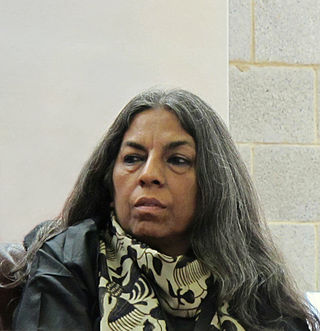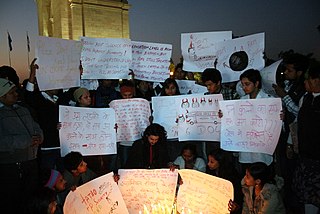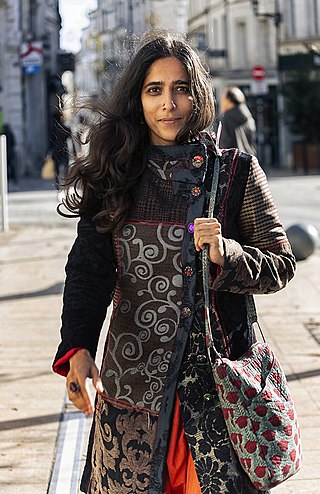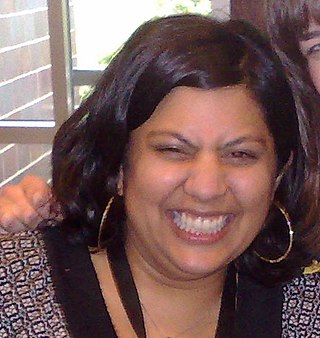Related Research Articles
Postfeminism is an alleged decrease in popular support for feminism from the 1990s onwards. It can be considered a critical way of understanding the changed relations between feminism, femininity and popular culture. The term is sometimes confused with subsequent feminisms such as fourth-wave feminism, postmodern feminism, and xenofeminism.

Urvashi Butalia is an Indian feminist writer, publisher and activist. She is known for her work in the women's movement of India, as well as for authoring books such as The Other Side of Silence: Voices from and the Partition of India and Speaking Peace: Women's Voices from Kashmir.

Feminism in India is a set of movements aimed at defining, establishing, and defending equal political, economic, and social rights and opportunities for women in India. It is the pursuit of women's rights within the society of India. Like their feminist counterparts all over the world, feminists in India seek gender equality: the right to work for equality in wages, the right to equal access to health and education, and equal political rights. Indian feminists also have fought against culture-specific issues within India's patriarchal society, such as inheritance laws.
Flavia Agnes is an Indian women's rights lawyer with expertise in marital, divorce, and property law. She has published articles in the journals Subaltern Studies, Economic and Political Weekly, and Manushi. She writes on themes of minorities and law, gender and law, law in the context of women's movements, and on issues of domestic violence, feminist jurisprudence, and minority rights. She is also a lecturer.
Fourth-wave feminism is a feminist movement that began around the early 2010s and is characterized by a focus on the empowerment of women, the use of internet tools, and intersectionality. The fourth wave seeks greater gender equality by focusing on gendered norms and the marginalization of women in society.
Samhita Arni is an Indian writer who writes in English. She is best known for her adaptations of Indian epic poetry. She started writing and illustrating her first book The Mahabharatha - A Child’s View at the age of eight. The book then went on to be translated in seven languages and sold 50,000 copies worldwide. Her second book – Sita’s Ramayana – was on the New York Times Bestseller list for Graphic Novels for two weeks in 2011.

Amruta Patil is an Indian graphic novel author and painter.

Samhita Mukhopadhyay is an American writer and former executive editor of Teen Vogue. She writes about feminism, culture, race, politics, and dating. She is the author of Outdated: Why Dating is Ruining Your Love Life and the co-editor of the anthology, Nasty Women: Feminism, Resistance, and Revolution in Trump's America.

Dalit feminism is a feminist perspective that includes questioning caste and gender roles among the Dalit population and within feminism and the larger women's movement. Dalit women primarily live in South Asia, mainly in Bangladesh, India, Nepal and Pakistan. Dalit women face different challenges than women in oppressor castes in these countries. They are more likely to be poor, uneducated and socially marginalized. Dalit feminists advocate and have advocated for equal rights for Dalit women based on gender, caste and other issues. They have addressed conferences, created organizations and helped elect other Dalit women into political office.

Loryn Brantz is an American author and illustrator with a focus on feminism- and women-related topics. She wrote and illustrated the board book series Feminist Baby. She is also the creator of the webcomic series Jellybean Comics and the web-series The Good Advice Cupcake.
Florence Given is a British illustrator, writer, and influencer.
Jude Ellison Sady Doyle is an American feminist author.
Sarah Naqvi is an Indian contemporary textile artist, who is enrolled in the De Ateliers residency program in Amsterdam, Netherlands. Their work has received international recognition and has been described as subversive. Naqvi's art addresses topics such as gender, sexuality, race, religion, etc., while advocating for various social and feminist causes, including that of body positivity and opposition to menstruation stigma.
Opashona Ghosh is an Indian illustrator and graphic designer based in the city of Kolkata, West Bengal. Her works are known for a feminist approach to clubbing culture, mental and sexual health, and have been described to be 90s-inspired, pop-art-style works, featuring illustrations on gender and queer identity, drawing on into themes of femininity, gender appropriation and eroticism. According to the Verve magazine, her works are aimed towards questioning ideas on cultural acceptance, femininity, and queer identity.
Kadak Collective is a collaborative group of female artists from South Asia, who work on graphic art projects, including zines, publications, and other forms of story-telling. Its members include filmmaker and webcomic creator Aarthi Parthasarthy, comic artist and illustrator Kaveri Gopalakrishnan.
Janine Shroff is a London-based artist and illustrator of Indian origin. Her work explores themes of sexuality, identity, and the environment.

Deena Mohamed is an Egyptian graphic designer, graphic novelist, and illustrator, who was born and raised in Egypt. She made her debut at the age of 18 with her webcomic Qahera, combining both Islamic and feminist values. Mohamed has collaborated with various advocacy groups, such as Harassmap and Centre for Applied Human Rights, to create informational comics.
Ratchet feminism emerged in the United States from hip hop culture in the early 2000s, largely as a critique of, and a response to, respectability politics. It is distinct from black feminism, womanism, and hip hop feminism. Ratchet feminism coopts the derogatory term (ratchet). Other terms used to describe this concept include ratchet womanism as used by Georgia Tech professor Joycelyn Wilson or ratchet radicalism used by Rutgers professor Brittney Cooper. Ratchet is an identity embraced by many millennials and Gen Z black women and girls. The idea of ratchetness as empowering, or of ratchet feminism, has been articulated by artists and celebrities like Nicki Minaj, City Girls, Amber Rose, and Junglepussy, scholars like Brittney Cooper and Mikki Kendall, and through events like Amber Rose's SlutWalk. Many view ratchet feminism as a form of female empowerment that doesn't adhere to respectability politics.
References
- ↑ "Kruttika Susarla's Take On The 'Brand Brigade'". Verve . 24 September 2016.
- 1 2 Maria, Ashraya (25 December 2018). "Here Are 12 Feminist Artists We Loved In 2018". FII English. Retrieved 6 December 2020.
- 1 2 3 Jain, Priyanshi. "Kruttika Susarla". Platform magazine. Retrieved 6 December 2020.
- ↑ "People: Designers". Center for Urban Pedagogy . Archived from the original on 30 November 2020. Retrieved 6 December 2020.
- ↑ Ladha, Shubham (11 September 2018). "9 New Artists Making The LGBTQIA Universe A Tad More Colourful". Verve . Retrieved 6 December 2020.
- ↑ Mathew, Soumya (17 December 2017). "Gender through comic illustrations: Kruttika Susarla on intersectionality and how personal is political". The Indian Express .
- ↑ Sharma, Suridhi (26 February 2017). "Women power, rebranded". Deccan Chronicle. Retrieved 29 June 2021.
- ↑ "Meet Kruttika Susarla – The Artist Behind 36 Days Of Feminist Type". FII English. 3 May 2017.
- ↑ Dey, Sohini (9 March 2017). "5 Women Illustrators From India Who Use the Power of Art to Shatter Taboos and Change Mindsets". The Better India. Retrieved 29 June 2021.
- ↑ Tata, Huzan (17 June 2017). "The Female Gaze: Kruttika Susarla's 36 Days of Feminist Type". Verve . Retrieved 6 December 2020.
- ↑ Arni, Samhita (1 May 2019). "Female voices in ancient Indian literature". The Caravan. Retrieved 6 December 2020.